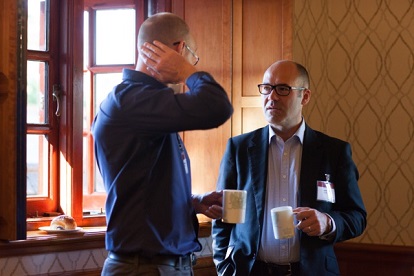Expert: Sean Hegarty, Europe Managing Director, Vanguard Facilitator: Georgia Stewart, CEO of Tumelo
Headlines:
- The three macro trends that will shape the future of advice are the advice gap, changing regulations, and technology (particularly AI)
- It was obvious from the discussions that the trends are interconnected and cannot be addressed separately
Context:
There was particular interest around AI and how it will be embedded into the wealth-management process. Perhaps it already has — I for one used ChatGPT to help summarise key points from the discussion for this blog.
AI could benefit wealth managers:
There is so much excitement (and caution) on AI, but the consensus is that there is huge potential for it to improve wealth management and private banking. The more obvious contribution AI could make is in terms of productivity: streamlining tax-related queries; summarising meetings and conversations; producing engaging PowerPoints; and more.
AI also has the potential to benefit clients by identifying their priorities perhaps by analysing their financial decisions, and anticipating their queries with relevant solutions.
At the moment, the roundtable was quite frank with the fact that AI is not yet being used in workflows; the room was particularly silent when I asked whether anyone knew if AI was being used in their businesses. The unanimous answer was "no". There is clearly still a lot of work to do to understand how the industry can best utilise AI to enhance their work.
Trust remains important, and human interaction is key:
Despite the benefits of AI, the group agreed that it cannot replace the role of human interactions. Trust is an invaluable currency in the wealth-management industry, and it is something that is built through interaction with a human — something which AI cannot replicate.
Of course, trust looks different for different demographics, and the right mix of human interaction and AI will depend on how comfortable clients are with technology. The reality is that the clients of today are not the tech-addicted generation Z; many advisers in the room were more focused on their baby boomer clients, with time-frames spanning the next 3-5 years.
However, I think it's important not to be scared of AI. This technology will never be perfect and free of errors, but neither will humans. Understanding clients' perspectives and where they are coming from will help advisers to figure out the best solution for their clients.
Working with regulators is key to meeting the industry’s needs:
Regulation was a key focus during the roundtable for various reasons. On the advice gap front, one participant highlighted a mismatch between the regulatory push for greater accessibility by reducing the cost of wealth-management advice, and the demand for personal contact, which is expensive. An unsophisticated attempt at regulating advisory prices could hurt advisers' quality of service and customer satisfaction.
It would be interesting to see how wider discussions around AI could affect how the FCA approaches regulating it within the financial industry. Already we can see how interested our Prime Minister Rishi Sunak is in using AI. I found one question which was raised during the discussion particularly interesting: will we need to take out AI insurance in the future, for when AI gets it wrong?
On the whole, our expert Sean Hegarty said that the FCA is committed to making regulatory updates to encourage the use of technology, and are taking a more tailored approach to which regulations will need changing.
Advisers need to tailor their advice to different demographics:
Part and parcel of the efforts to close the advice gap is the need for advisers to reach out to a wider audience. This means approaching clients from younger age bracket as well as female clients, who are expected to inherit trillions of assets from baby boomers. Advisers will need to gain clients' trust, and how that looks like will be different depending on who they are talking to.
From a technology perspective, Generation Z clients will undeniably be more receptive to AI integrations as they have grown up with technology all around them. On the other hand, older clients may not be as trusting of AI. This will force advisers to marry up their approach to closing the advice gap with the increasing urgency with which AI is banging on our doors.
Key takeaways:
- Ultimately, so many different things look set to impact the future of advice. It is crucial for the industry to engage with regulators and other stakeholders to help steer the direction of change towards something that is constructive and beneficial
- Specifically, advisers should lean into AI — to learn to trust it themselves, and to glean the value that's already there for their clients today
- That might be something as simple as preparing meeting notes, speeding up emails, or creating personalised content; or perhaps it's more sophisticated, with portfolio creation tools
- At the very, very least, my group needs to check out ChatGPT!


